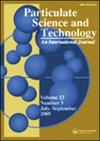Process optimization of nano-calcium carbonate produced from snail shell using supermasscollider
IF 1.5
4区 工程技术
Q3 ENGINEERING, CHEMICAL
引用次数: 0
Abstract
AbstractThis study uses the optimal (custom) design to focus on the supermasscolloider wet milling process for synthesizing calcium carbonate nanoparticles from the Achatina Fulica using the optimal (custom) design. The snail shell particle size of 150 μm from dry milling was wet milled to get smaller particle sizes. The response surface design method was used to investigate the effect of independent parameters such as consistency (amount of microparticle loading in calcium carbonate suspension) and the number of runs on the particle size of calcium carbonate produced using a supermasscolloider. Results show that the microparticle loading in calcium carbonate suspension and the number of runs significantly affected the synthesized particles. The increase in microparticle loading reduced the effectiveness of the supermasscolloider blade, resulting in the production of particle sizes ranging from 21- to 40 nm. A higher number of runs with a smaller loading of microparticles in calcium carbonate suspension offered a fine particle size of 21.30 nm. The experimental data quartic polynomial models gave a coefficient of determination (R2) of 0.92. The optimum milling runs of 750 and 1% consistency microparticle loading produced a calcium carbonate nanoparticle size of 21 nm. This technique has shown that calcium carbonate nanoparticles can be produced at low cost, at less period, with low agglomeration from Achatina Fulica shell using supermasscolloider.Keywords: Achatina fulica shellparticle sizenano-CaCo3supermasscolloidermilling processdesign expect AcknowledgmentsThe authors want to acknowledge the University of KwaZulu-Natal, where this research was conducted and that the abstract presented at PolyScience2022, having the same title as this manuscript, is entirely different from the result reported in this study. The study presented was a pilot study toward achieving the result reported in this study.Disclosure statementNo potential conflict of interest was reported by the author(s).Data availability statementThe authors want to declare that the data reported in this article can be deposited in a repository.超质量对撞机制备蜗牛壳纳米碳酸钙工艺优化
摘要本研究采用优化(定制)设计,对超质量胶体湿磨工艺进行了优化(定制)设计,研究了利用超质量胶体湿磨工艺合成纳米碳酸钙的工艺流程。将干磨后粒径为150 μm的螺壳进行湿磨,得到更小的螺壳颗粒。采用响应面设计方法考察了浓度(碳酸钙悬浮液中微粒的负载量)和运行次数等独立参数对超质量胶体法制备碳酸钙粒径的影响。结果表明,碳酸钙悬浮液中微粒的负载和运行次数对合成的微粒有显著影响。微粒负荷的增加降低了超大质量胶体刀片的效率,导致颗粒尺寸在21- 40 nm之间。在碳酸钙悬浮液中,较高的运行次数和较小的微颗粒负载提供了21.30 nm的细颗粒尺寸。实验数据的四次多项式模型的决定系数(R2)为0.92。最佳磨粉量为750,颗粒浓度为1%时,碳酸钙纳米颗粒的粒径为21 nm。该技术表明,利用超质量胶体,可以以低成本、短周期、低团聚的方式从黄果壳中制备碳酸钙纳米颗粒。作者要感谢进行这项研究的夸祖鲁-纳塔尔大学,并且在PolyScience2022上发表的与本文标题相同的摘要与本研究报告的结果完全不同。本研究是一项初步研究,旨在实现本研究报告的结果。披露声明作者未报告潜在的利益冲突。数据可用性声明作者希望声明本文中报告的数据可以存储在存储库中。
本文章由计算机程序翻译,如有差异,请以英文原文为准。
求助全文
约1分钟内获得全文
求助全文
来源期刊

Particulate Science and Technology
工程技术-工程:化工
CiteScore
4.40
自引率
4.00%
发文量
86
审稿时长
12 months
期刊介绍:
Particulate Science and Technology, an interdisciplinary journal, publishes papers on both fundamental and applied science and technology related to particles and particle systems in size scales from nanometers to millimeters. The journal''s primary focus is to report emerging technologies and advances in different fields of engineering, energy, biomaterials, and pharmaceutical science involving particles, and to bring institutional researchers closer to professionals in industries.
Particulate Science and Technology invites articles reporting original contributions and review papers, in particular critical reviews, that are relevant and timely to the emerging and growing fields of particle and powder technology.
 求助内容:
求助内容: 应助结果提醒方式:
应助结果提醒方式:


